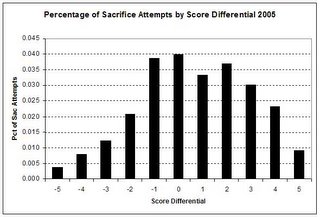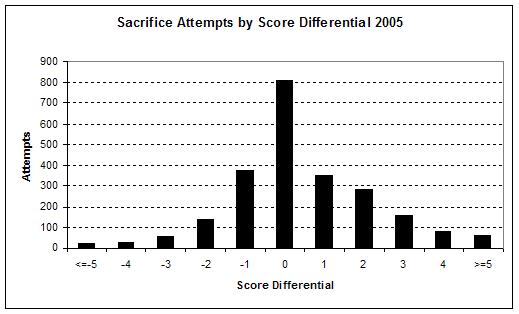I know I said in an earlier post that I'd put the topic of sacrificing to bed for this offseason but I just had to address one more issue raised in the discussion of the article "Sacrificing in 2005 Redux" at "Primery Numbers" on Baseball Think Factory (and I apologize for not participating in these discussions but I always forget to go look for them after I post an article).
The comment that spurred this post went like this:
"Shouldn't those "bunting frequency by score differential" be normalised by "bunting opportunities by score differential."
Do managers bunt more often in close games because the bunt a greater %ge of the time when the score is closer (which is what is implied), or is it just that there are more close games than blowouts, (and even blowouts start close)?"
What the questioner is referring to is a table and accompanying chart that lists the number of sacrifice attempts by score differential for 2005. That data shows that managers bunt more than twice as often with the score tied than when being ahead a run or behind a run as shown in the graph.
Of course the questioner is correct that this doesn't show a true picture since it omits the opportunities the manager had to sacrifice. So I reran the numbers, this time including the number of plate appearances with runners on base by score differential and then calculated a percentage of sacrifice attempts for each. The graph follows.
Diff Runners On SacAtt PctAtt SuccPct
<=-5 5591 21 0.004 0.909
-4 2946 23 0.008 0.739
-3 4426 54 0.012 0.722
-2 6653 138 0.021 0.725
-1 9763 377 0.039 0.769
0 20293 809 0.040 0.782
1 10567 352 0.033 0.730
2 7677 284 0.037 0.771
3 5217 158 0.030 0.747
4 3465 80 0.023 0.800
>=5 6527 59 0.009 0.750
And the graph.

What this shows is that managers in 2005 bunted as often when down by a run as when tied and just slightly less when ahead by 1,2, or 3 runs before forgoeing the sacrifice. It also shows that they sacrifice much less often when down by 2 runs than when down by 1. Apparently, the 2 run deficit is viewed much differently than the one run.


125x125_10off+copy.jpg)



No comments:
Post a Comment